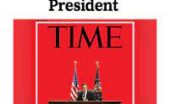Johannah Bernstein post: "eternally proud of my father’s extraordinary aeronautical engineering. legacy. here is a photo of the Canadair Water…
Wednesday Night #1522
Written by Diana Thebaud Nicholson // May 3, 2011 // Herb Bercovitz, Kimon Valskakis, Reports, Wednesday Nights // 1 Comment
A recent Facebook post sums it up: Tornadoes, Royal Wedding, Bin Laden, and now Harper. Okay, that’s it. This week is officially full and won’t be accepting any new entries. We would only quibble with `Harper`- the big story is the Orange Crush – and, of course, at a local level, the incredible cliff-hanger in Westmount-Ville-Marie. We are relieved and delighted that Marc Garneau prevailed.
[Editor’s note: the intense discussion – and passion – regarding Osama’s death at the hands of U.S. Navy SEALS and the outcome of the federal elections left little time for tornadoes or the Royal Wedding]
Osama bin Laden has been shot dead, not in the heat of battle, but by U.S. Navy SEALS who had invaded a presumably friendly sovereign country with the sole purpose of committing this murder. The psychological impact of this act avenging the World Trade Building massacre of 9-11 cannot be underestimated, nor can the joy of the American public or the sudden surge in reputation of the President whose popularity had been sagging. In effect the U.S. acted as policeman, judge and executioner.
While a majority of those present agree that the United States was right to kill Osama, many questions arise as to the way that the mission was carried out and even more, the way the announcement has been handled.
This was not the first revenge killing by a nation. What comes to mind is the seeking out and revenge killing of the Black September members accused of the massacre of Israeli athletes at the 1972 Olympic Games; but the murder of Bin Laden was perpetrated by a nation that boasts of a judicial system which protects the rights of all, even those accused of murder. While a number of Wednesday Nighters believe the action was justified, it is hard to reconcile the triumphant announcement of the killing with the traditional (at least) public moral stance of the nation. Others question the wisdom of releasing so much information about the mission.
The obvious alternative was to have arrested him and brought him to trial before an unbiased international court. However, like most issues, justice is not linear. [Editor’s note: Should Osama Bin Laden have been caught and tried? by Jon Silverman Professor of media and criminal justice, University of Bedfordshire succinctly summarizes many of the arguments presented by Wednesday Nighters] Would the same objection have been raised if he had been killed in his cave in the mountains of Afghanistan in order to collect a reward offered by the U.S? Pancho Villa was assassinated by the Mexican government, Adolph Eichmann kidnapped, tried and executed by Israel, Saddam Hussein by the U.S.
The United States, however, claims to hold higher standards for the presumption of innocence.
Did the U.S. aircraft invade Pakistani airspace, or was Pakistan a silent partner of the Americans? Is it coincidental or accidental that the deed was done at a time of flagging popularity of the U.S. President?
It strains credulity to think that the Pakistanis were totally unaware of the identity of the inhabitants of the Bin Laden compound, but had he been taken alive, the arrest and virtual kidnapping of Bin Laden would have proven very difficult diplomatically. Many believe that Al Q’aida is no longer a centralized operation with Bin Laden as leader and coordinator which, if true, raises the question of the purpose or necessity of carrying out this dangerous, controversial, expensive operation. The decision to not release the photos appears to be morally justified, but sceptics believe that ultimately, perhaps in four or five years, they will resurface and ultimately be released. [Editor’s note: The Economist When a state kills its enemies remotely, the law gets tangled offers a good examination of the questions raised and debated this evening. We are also grateful to Amara Possian for forwarding two articles that express the arguments of a number of (but certainly not all) Wednesday Nighters: The Ability to Kill Osama Bin Laden Does Not Make America Great and The Devil likely died happy by CBC’s Neil Macdonald.
Canada’s (federal) election
The unanticipated results of this week’s federal election, giving a majority government that was elected by only some 40% of those who voted (who in turn represented only 61.4% of the eligible population) lead to many unanswered questions, and bring into sharp focus the flaws in the Westminster system, lucidly exposed by Kimon Valaskakis , who argues that the system is functional only with a two-party system. He suggested other options including proportional representation that allocates seats on the basis of proportion of votes, but which has weaknesses and leads to a proliferation of fringe parties (Israel & Italy come to mind). Two-phase runoff elections, similar to the multiple voting system for party leaders practiced in Canada, make more sense and lead to a far more acceptable consensus.
The principal result of the current election is that the Conservatives who now have a majority in both houses have free rein to do as they please. Meanwhile, it must be recognized that in a majority government the Opposition has little influence, and the NDP’s problems will be compounded by the need to ‘educate’ the numerous young and/or inexperienced candidates, who will be on a learning curve over the next four years.
It is feared that Québec’s virtual loss of influence in Ottawa might once again fan the flames of independence, unless the NDP decides to establish a Québec wing and enter into provincial politics. On the positive side, the involvement of Canada’s youth in politics augurs well for the political future of our country. The to-many-surprising lagging support of the Bloc is attributed by some to the changing demographics in Québec due to immigration. An interesting point has been made that despite the gigantic shift in the political map, the voter turnout was up by only three percent in Canada, and by one percent in Québec. Thus, Mr. Harper’s Conservatives have won 54.22% of the seats with only 39.62% of the votes cast – and nearly 39% of eligible voters did not vote.
Marc Garneau‘s win in Westmount-Ville-Marie was perhaps the only news that was greeted by universal enthusiasm around the room.
*************
The Prologue
Taking the outstanding items one-by one:
Tornadoes – the largest ‘outbreak’ (we find that an odd word) recorded in the nation’s history battered the U.S. South, causing tragic damage and loss of life, and leaving us to wonder how much more that part of the U.S. can withstand.
The Royal Wedding – what can one say that has not already been said both for and against? Our friend John Moore, definitely not a royalist, has an interesting viewpoint on the derivation of the Windsors’ aura, he sums it up with a quotation from John Curtin’s film Chasing the Royals “There is an aura but it doesn’t come from her [the Queen]. It comes from us. The moment we stop giving it to her it’s over.” It was beautiful in every respect and we look forward to the release of the CD of the music which was magnificent. It will be interesting to find out – if we ever do – how much the U.K. economy benefitted. Do the media have to pay for broadcast rights, as for the Olympics? We suspect not, but maybe The Firm should consider the option. Our favorite comment from a friend, viewing the photos of Fergie’s daughters: “First we have Cinderella and then the ugly stepsisters”.
Osama’s death – the short and long-term impact is widely debated by those in the know and not. Of the former, Robert Fisk juxtaposes (we are using this as a verb – well, why not?) “Fresh from providing us with a copy of his birth certificate, the American President turned up in the middle of the night to provide us with a live-time death certificate for Osama bin Laden”. As always, his article is well worth reading. Was he betrayed? Of course. Pakistan knew Bin Laden’s hiding place all along
Bin Laden died a failure, outstripped by history
The mass revolutions in the Arab world this year mean that al-Qa’ida is already politically dead.
The election
The pundits have had and will continue to have a field day. Two Party Leaders gone. The Bloc decimated and the Liberals humiliated. Mr. Harper has his majority without Québec, and we are not thrilled by either development. With the emergence of the NDP as a national force – and the official opposition, the face of Canada has truly changed. As Tony Deutsch commented to us: “Jack Layton’s professional skills as a politician are not to be underestimated. This time, he will have an awful caucus to keep together for four years. Political Science students will be writing quantitative Ph.D.s for years on how many votes the much publicized “Layton surge” drove to the Tories.”
Meantime, as part of the changing face narrative – don’t you hate that new expression? –
Four McGill students elected to parliament
Charmaine Borg, Matthew Dubé, Mylène Freeman and Laurin Liu were all NDP candidates in Quebec ridings
Our irrepressible Tony comments “McGill has rules about faculty members serving as MP’s or cabinet ministers. Now, someone will have to figure out what to do about students who serve.”
and
With 100 rookie MPs, Parliament faces ‘the proverbial herding cats’
Like many of you, we were up very late last night and today are feeling somewhat stunned, thus this is a quick overview of some of the items that could be on our agenda. We will add more (though probably not about the Royal Wedding) as we continue to absorb the events of the week.




One Comment on "Wednesday Night #1522"
I’m sorry that I’m going to miss the post-election Wednesday night. I did come across something very interesting that I would like to share with you in case the subject comes up.
As wonderful as it is for McGill to have undergrad MP’s did you know that the elected candidates are not even eligible to apply for our Parliament’s internship programme (see: http://www.pip-psp.org/apply-e.html which requires that applicants for the internship programme have already completed at least one university degree).
In my point of view, endorsing unqualified candidates to run on behalf of his Party is Jack Layton’s first mistake as the leader of the official opposition.
It is my belief that every party leader has a responsibility to Canadian voters to put the best qualified most experienced candidates possible forward for our consideration. Just as a CEO wouldn’t hire someone who can’t do the job, so too should a party leader make sure that the only people he agrees to put on the ballot under his Party’s name are those that he believes can do the job – even if he doesn’t really expect them to get the opportunity.
Does Layton really believe that people who don’t meet the minimum requirements to be an intern are the best choice Canadian’s have for MP’s? If he does it speaks badly for the quality of the NDP that no one better could be found. If he doesn’t then he has been remiss in his duties and responsibilities to all Canadians – not a good start for our official opposition.